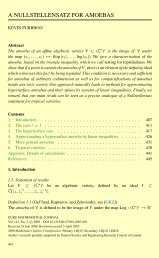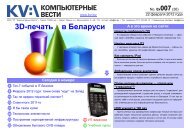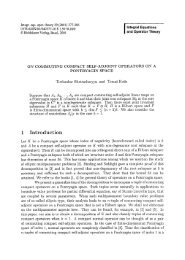computing lives - FTP Directory Listing
computing lives - FTP Directory Listing
computing lives - FTP Directory Listing
You also want an ePaper? Increase the reach of your titles
YUMPU automatically turns print PDFs into web optimized ePapers that Google loves.
A<br />
Computer Previous Page | Contents | Zoom in | Zoom out | Front Cover | Search Issue | Next Page M S BE<br />
aG<br />
F<br />
COVER FEATURE<br />
Karthik Kumar and Yung-Hsiang Lu, Purdue University<br />
The cloud heralds a new era of <strong>computing</strong><br />
where application services are provided<br />
through the Internet. Cloud <strong>computing</strong><br />
can enhance the <strong>computing</strong> capability of<br />
mobile systems, but is it the ultimate solution<br />
for extending such systems’ battery<br />
lifetimes?<br />
Cloud <strong>computing</strong> 1 is a new paradigm in which<br />
<strong>computing</strong> resources such as processing,<br />
memory, and storage are not physically present<br />
at the user’s location. Instead, a service<br />
provider owns and manages these resources,<br />
and users access them via the Internet. For example,<br />
Amazon Web Services lets users store personal data via<br />
its Simple Storage Service (S3) and perform computations<br />
on stored data using the Elastic Compute Cloud (EC2).<br />
This type of <strong>computing</strong> provides many advantages<br />
for businesses—including low initial capital investment,<br />
shorter start-up time for new services, lower maintenance<br />
and operation costs, higher utilization through virtualization,<br />
and easier disaster recovery—that make cloud<br />
<strong>computing</strong> an attractive option. Reports suggest that there<br />
are several benefits in shifting <strong>computing</strong> from the desktop<br />
to the cloud. 1,2 What about cloud <strong>computing</strong> for mobile<br />
users? The primary constraints for mobile <strong>computing</strong> are<br />
limited energy and wireless bandwidth. Cloud <strong>computing</strong><br />
can provide energy savings as a service to mobile users,<br />
though it also poses some unique challenges.<br />
0018-9162/10/$26.00 © 2010 IEEE<br />
CLOUD COMPUTING<br />
FOR MOBILE USERS:<br />
CAN OFFLOADING<br />
COMPUTATION<br />
SAVE ENERGY?<br />
Published by the IEEE Computer Society<br />
SAVING ENERGY FOR MOBILE SYSTEMS<br />
Mobile systems, such as smart phones, have become<br />
the primary <strong>computing</strong> platform for many users. Various<br />
studies have identified longer battery lifetime as the most<br />
desired feature of such systems. A 2005 study of users in<br />
15 countries 3 found longer battery life to be more important<br />
than all other features, including cameras or storage. A<br />
survey last year by ChangeWave Research 4 revealed short<br />
battery life to be the most disliked characteristic of Apple’s<br />
iPhone 3GS, while a 2009 Nokia poll showed that battery<br />
life was the top concern of music phone users.<br />
Many applications are too computation intensive to<br />
perform on a mobile system. If a mobile user wants to use<br />
such applications, the computation must be performed in<br />
the cloud. Other applications such as image retrieval, voice<br />
recognition, gaming, and navigation can run on a mobile<br />
system. However, they consume significant amounts of<br />
energy. Can offloading these applications to the cloud save<br />
energy and extend battery lifetimes for mobile users?<br />
Low-power design has been an active research topic for<br />
many years. In IEEE Xplore, searching “low” and “power”<br />
in the document title produces more than 5,000 results.<br />
There are four basic approaches to saving energy and extending<br />
battery lifetime in mobile devices:<br />
Adopt a new generation of semiconductor technology.<br />
As transistors become smaller, each transistor<br />
consumes less power. Unfortunately, as transistors<br />
become smaller, more transistors are needed to provide<br />
more functionalities and better performance; as<br />
a result, power consumption actually increases.<br />
APRIL 2010<br />
A<br />
Computer Previous Page | Contents | Zoom in | Zoom out | Front Cover | Search Issue | Next Page M S BE<br />
aG<br />
F<br />
51

















